Young People as Co-Designers of Civics Curriculum
VerifiedAdded on 2020/03/16
|8
|2168
|129
Essay
AI Summary
This essay discusses the critical role of young people as co-designers of school-based civics curriculum. It highlights the importance of inclusive education in fostering active citizenship and democratic engagement among youth. The paper argues that involving young people in the curriculum design process can address issues of political disengagement and enhance their understanding of democracy, civic responsibilities, and the importance of participation in democratic processes. By recognizing youth as valuable contributors to civic education, the essay advocates for a curriculum that reflects their perspectives and prepares them for active citizenship.
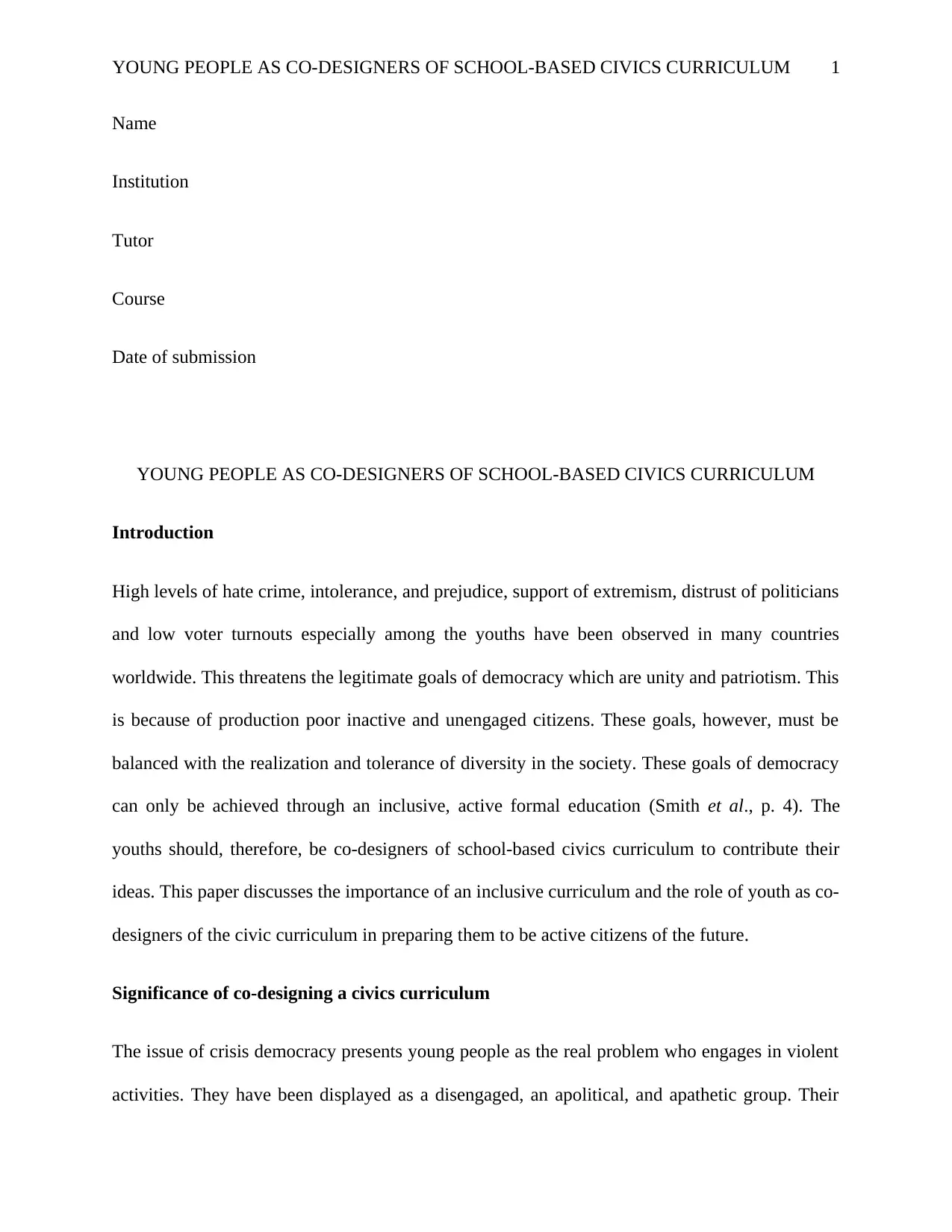
YOUNG PEOPLE AS CO-DESIGNERS OF SCHOOL-BASED CIVICS CURRICULUM 1
Name
Institution
Tutor
Course
Date of submission
YOUNG PEOPLE AS CO-DESIGNERS OF SCHOOL-BASED CIVICS CURRICULUM
Introduction
High levels of hate crime, intolerance, and prejudice, support of extremism, distrust of politicians
and low voter turnouts especially among the youths have been observed in many countries
worldwide. This threatens the legitimate goals of democracy which are unity and patriotism. This
is because of production poor inactive and unengaged citizens. These goals, however, must be
balanced with the realization and tolerance of diversity in the society. These goals of democracy
can only be achieved through an inclusive, active formal education (Smith et al., p. 4). The
youths should, therefore, be co-designers of school-based civics curriculum to contribute their
ideas. This paper discusses the importance of an inclusive curriculum and the role of youth as co-
designers of the civic curriculum in preparing them to be active citizens of the future.
Significance of co-designing a civics curriculum
The issue of crisis democracy presents young people as the real problem who engages in violent
activities. They have been displayed as a disengaged, an apolitical, and apathetic group. Their
Name
Institution
Tutor
Course
Date of submission
YOUNG PEOPLE AS CO-DESIGNERS OF SCHOOL-BASED CIVICS CURRICULUM
Introduction
High levels of hate crime, intolerance, and prejudice, support of extremism, distrust of politicians
and low voter turnouts especially among the youths have been observed in many countries
worldwide. This threatens the legitimate goals of democracy which are unity and patriotism. This
is because of production poor inactive and unengaged citizens. These goals, however, must be
balanced with the realization and tolerance of diversity in the society. These goals of democracy
can only be achieved through an inclusive, active formal education (Smith et al., p. 4). The
youths should, therefore, be co-designers of school-based civics curriculum to contribute their
ideas. This paper discusses the importance of an inclusive curriculum and the role of youth as co-
designers of the civic curriculum in preparing them to be active citizens of the future.
Significance of co-designing a civics curriculum
The issue of crisis democracy presents young people as the real problem who engages in violent
activities. They have been displayed as a disengaged, an apolitical, and apathetic group. Their
Paraphrase This Document
Need a fresh take? Get an instant paraphrase of this document with our AI Paraphraser
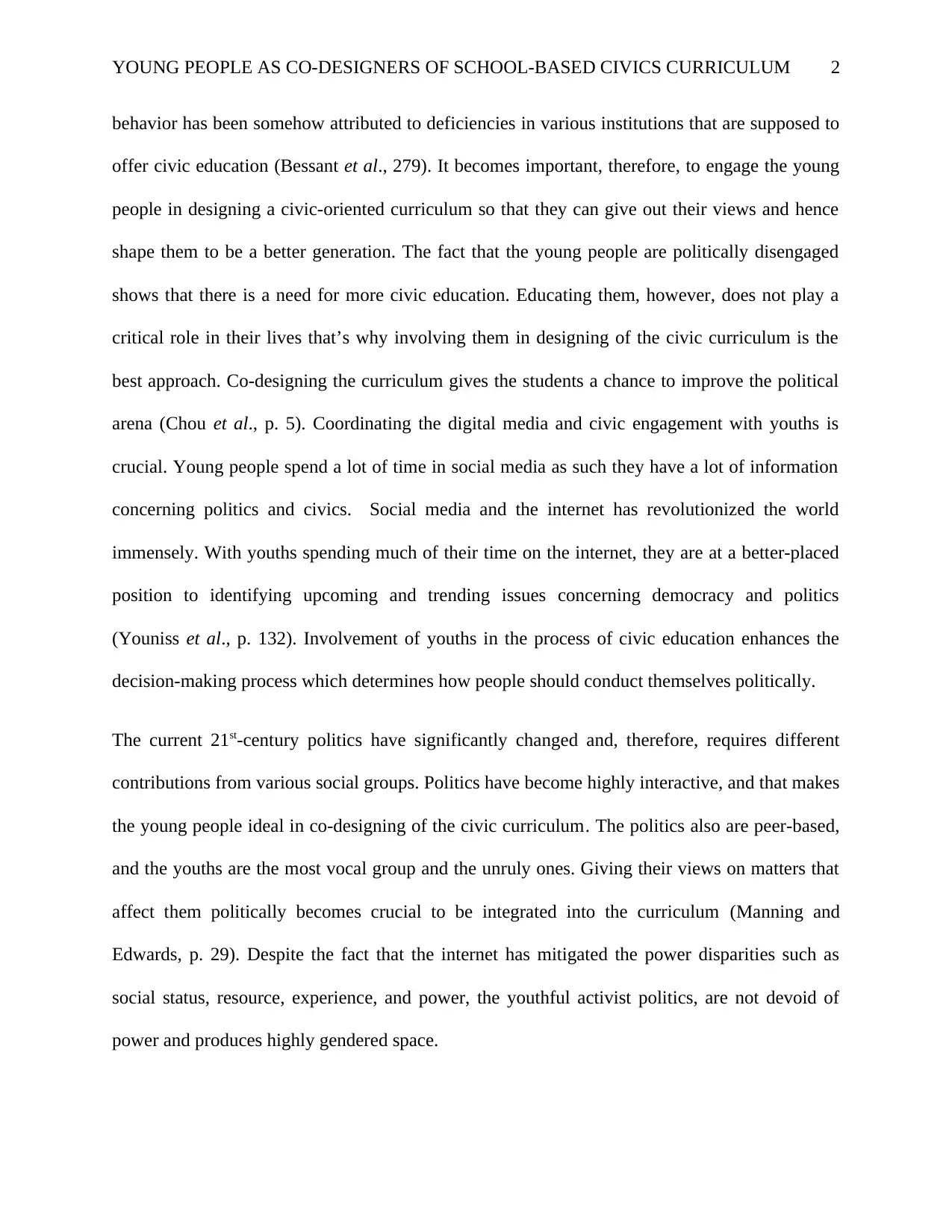
YOUNG PEOPLE AS CO-DESIGNERS OF SCHOOL-BASED CIVICS CURRICULUM 2
behavior has been somehow attributed to deficiencies in various institutions that are supposed to
offer civic education (Bessant et al., 279). It becomes important, therefore, to engage the young
people in designing a civic-oriented curriculum so that they can give out their views and hence
shape them to be a better generation. The fact that the young people are politically disengaged
shows that there is a need for more civic education. Educating them, however, does not play a
critical role in their lives that’s why involving them in designing of the civic curriculum is the
best approach. Co-designing the curriculum gives the students a chance to improve the political
arena (Chou et al., p. 5). Coordinating the digital media and civic engagement with youths is
crucial. Young people spend a lot of time in social media as such they have a lot of information
concerning politics and civics. Social media and the internet has revolutionized the world
immensely. With youths spending much of their time on the internet, they are at a better-placed
position to identifying upcoming and trending issues concerning democracy and politics
(Youniss et al., p. 132). Involvement of youths in the process of civic education enhances the
decision-making process which determines how people should conduct themselves politically.
The current 21st-century politics have significantly changed and, therefore, requires different
contributions from various social groups. Politics have become highly interactive, and that makes
the young people ideal in co-designing of the civic curriculum. The politics also are peer-based,
and the youths are the most vocal group and the unruly ones. Giving their views on matters that
affect them politically becomes crucial to be integrated into the curriculum (Manning and
Edwards, p. 29). Despite the fact that the internet has mitigated the power disparities such as
social status, resource, experience, and power, the youthful activist politics, are not devoid of
power and produces highly gendered space.
behavior has been somehow attributed to deficiencies in various institutions that are supposed to
offer civic education (Bessant et al., 279). It becomes important, therefore, to engage the young
people in designing a civic-oriented curriculum so that they can give out their views and hence
shape them to be a better generation. The fact that the young people are politically disengaged
shows that there is a need for more civic education. Educating them, however, does not play a
critical role in their lives that’s why involving them in designing of the civic curriculum is the
best approach. Co-designing the curriculum gives the students a chance to improve the political
arena (Chou et al., p. 5). Coordinating the digital media and civic engagement with youths is
crucial. Young people spend a lot of time in social media as such they have a lot of information
concerning politics and civics. Social media and the internet has revolutionized the world
immensely. With youths spending much of their time on the internet, they are at a better-placed
position to identifying upcoming and trending issues concerning democracy and politics
(Youniss et al., p. 132). Involvement of youths in the process of civic education enhances the
decision-making process which determines how people should conduct themselves politically.
The current 21st-century politics have significantly changed and, therefore, requires different
contributions from various social groups. Politics have become highly interactive, and that makes
the young people ideal in co-designing of the civic curriculum. The politics also are peer-based,
and the youths are the most vocal group and the unruly ones. Giving their views on matters that
affect them politically becomes crucial to be integrated into the curriculum (Manning and
Edwards, p. 29). Despite the fact that the internet has mitigated the power disparities such as
social status, resource, experience, and power, the youthful activist politics, are not devoid of
power and produces highly gendered space.
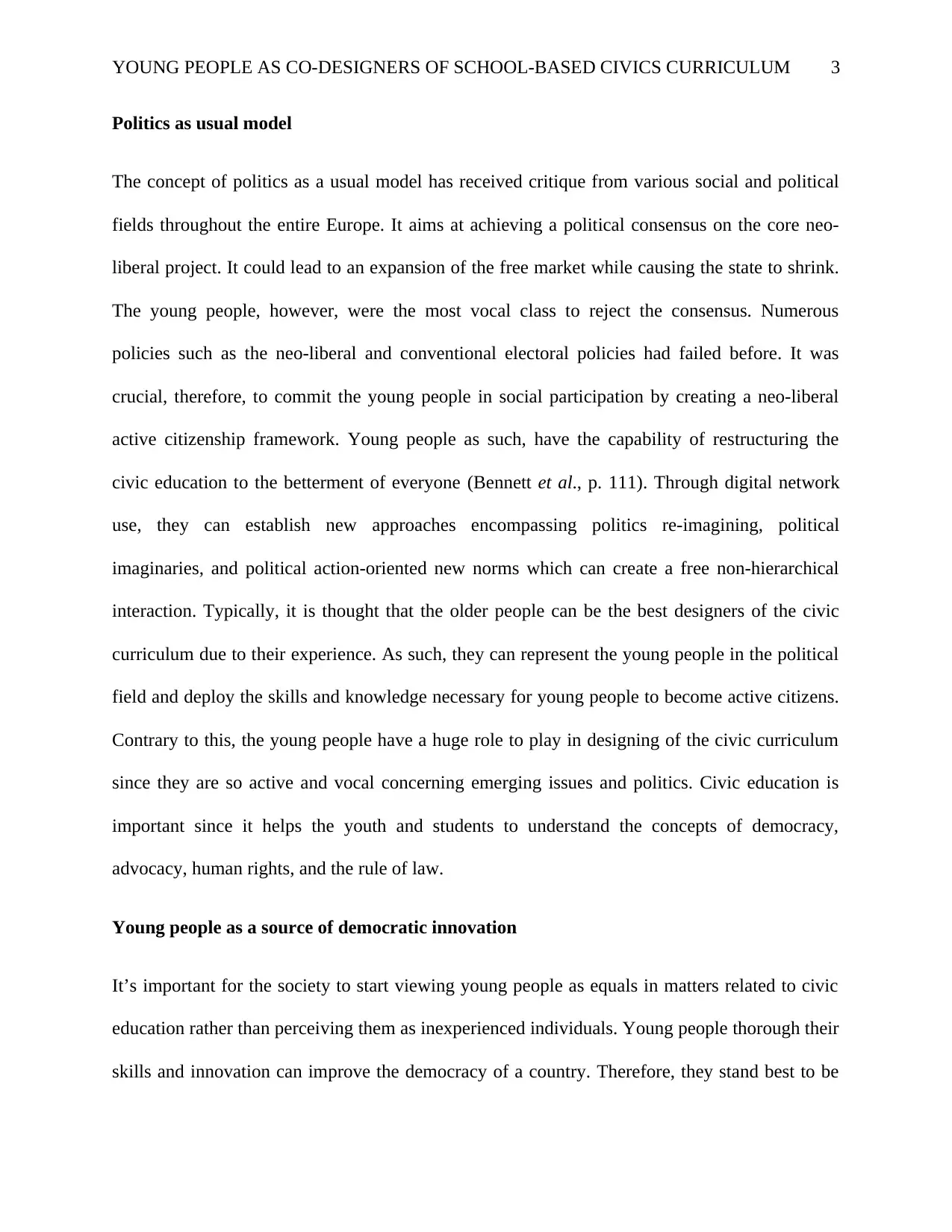
YOUNG PEOPLE AS CO-DESIGNERS OF SCHOOL-BASED CIVICS CURRICULUM 3
Politics as usual model
The concept of politics as a usual model has received critique from various social and political
fields throughout the entire Europe. It aims at achieving a political consensus on the core neo-
liberal project. It could lead to an expansion of the free market while causing the state to shrink.
The young people, however, were the most vocal class to reject the consensus. Numerous
policies such as the neo-liberal and conventional electoral policies had failed before. It was
crucial, therefore, to commit the young people in social participation by creating a neo-liberal
active citizenship framework. Young people as such, have the capability of restructuring the
civic education to the betterment of everyone (Bennett et al., p. 111). Through digital network
use, they can establish new approaches encompassing politics re-imagining, political
imaginaries, and political action-oriented new norms which can create a free non-hierarchical
interaction. Typically, it is thought that the older people can be the best designers of the civic
curriculum due to their experience. As such, they can represent the young people in the political
field and deploy the skills and knowledge necessary for young people to become active citizens.
Contrary to this, the young people have a huge role to play in designing of the civic curriculum
since they are so active and vocal concerning emerging issues and politics. Civic education is
important since it helps the youth and students to understand the concepts of democracy,
advocacy, human rights, and the rule of law.
Young people as a source of democratic innovation
It’s important for the society to start viewing young people as equals in matters related to civic
education rather than perceiving them as inexperienced individuals. Young people thorough their
skills and innovation can improve the democracy of a country. Therefore, they stand best to be
Politics as usual model
The concept of politics as a usual model has received critique from various social and political
fields throughout the entire Europe. It aims at achieving a political consensus on the core neo-
liberal project. It could lead to an expansion of the free market while causing the state to shrink.
The young people, however, were the most vocal class to reject the consensus. Numerous
policies such as the neo-liberal and conventional electoral policies had failed before. It was
crucial, therefore, to commit the young people in social participation by creating a neo-liberal
active citizenship framework. Young people as such, have the capability of restructuring the
civic education to the betterment of everyone (Bennett et al., p. 111). Through digital network
use, they can establish new approaches encompassing politics re-imagining, political
imaginaries, and political action-oriented new norms which can create a free non-hierarchical
interaction. Typically, it is thought that the older people can be the best designers of the civic
curriculum due to their experience. As such, they can represent the young people in the political
field and deploy the skills and knowledge necessary for young people to become active citizens.
Contrary to this, the young people have a huge role to play in designing of the civic curriculum
since they are so active and vocal concerning emerging issues and politics. Civic education is
important since it helps the youth and students to understand the concepts of democracy,
advocacy, human rights, and the rule of law.
Young people as a source of democratic innovation
It’s important for the society to start viewing young people as equals in matters related to civic
education rather than perceiving them as inexperienced individuals. Young people thorough their
skills and innovation can improve the democracy of a country. Therefore, they stand best to be
⊘ This is a preview!⊘
Do you want full access?
Subscribe today to unlock all pages.

Trusted by 1+ million students worldwide
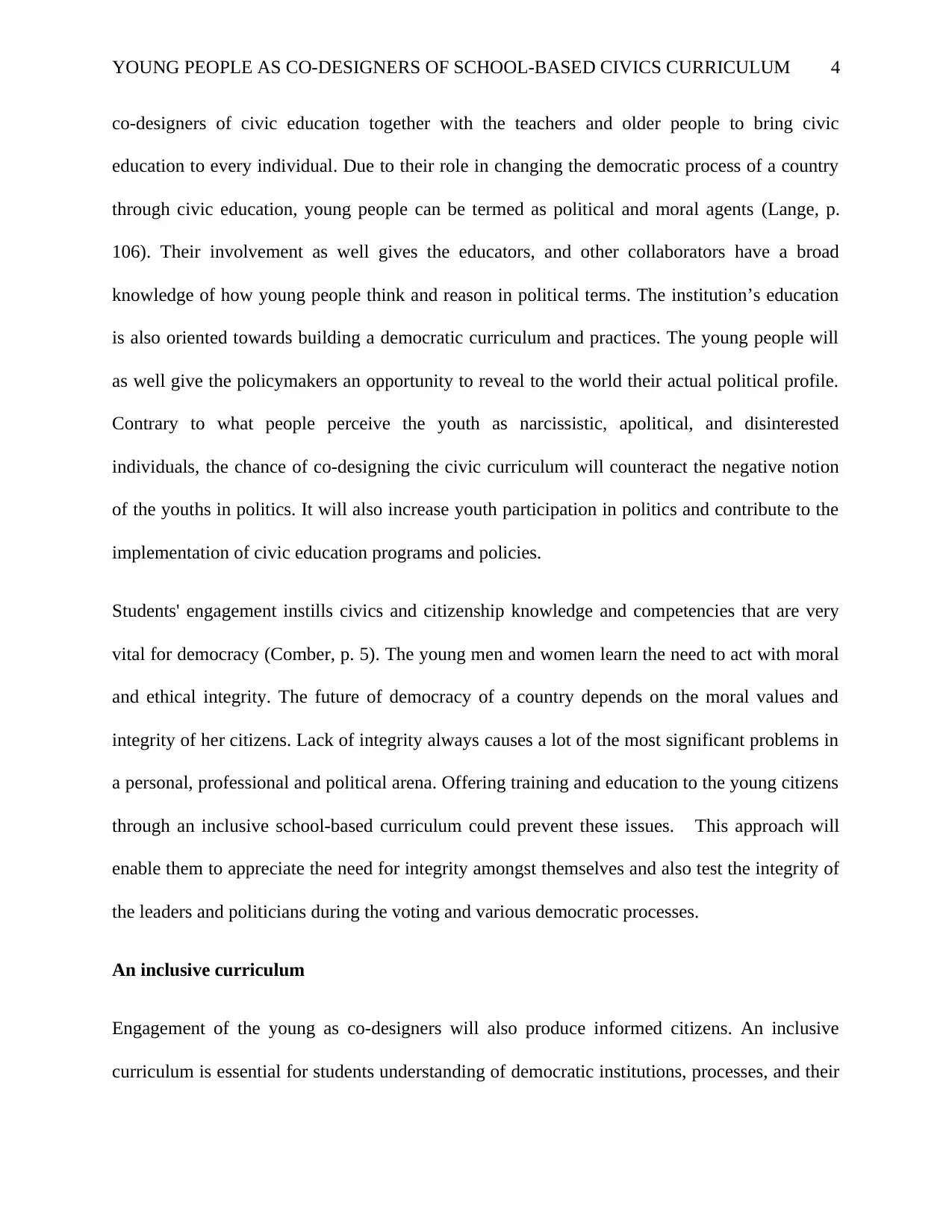
YOUNG PEOPLE AS CO-DESIGNERS OF SCHOOL-BASED CIVICS CURRICULUM 4
co-designers of civic education together with the teachers and older people to bring civic
education to every individual. Due to their role in changing the democratic process of a country
through civic education, young people can be termed as political and moral agents (Lange, p.
106). Their involvement as well gives the educators, and other collaborators have a broad
knowledge of how young people think and reason in political terms. The institution’s education
is also oriented towards building a democratic curriculum and practices. The young people will
as well give the policymakers an opportunity to reveal to the world their actual political profile.
Contrary to what people perceive the youth as narcissistic, apolitical, and disinterested
individuals, the chance of co-designing the civic curriculum will counteract the negative notion
of the youths in politics. It will also increase youth participation in politics and contribute to the
implementation of civic education programs and policies.
Students' engagement instills civics and citizenship knowledge and competencies that are very
vital for democracy (Comber, p. 5). The young men and women learn the need to act with moral
and ethical integrity. The future of democracy of a country depends on the moral values and
integrity of her citizens. Lack of integrity always causes a lot of the most significant problems in
a personal, professional and political arena. Offering training and education to the young citizens
through an inclusive school-based curriculum could prevent these issues. This approach will
enable them to appreciate the need for integrity amongst themselves and also test the integrity of
the leaders and politicians during the voting and various democratic processes.
An inclusive curriculum
Engagement of the young as co-designers will also produce informed citizens. An inclusive
curriculum is essential for students understanding of democratic institutions, processes, and their
co-designers of civic education together with the teachers and older people to bring civic
education to every individual. Due to their role in changing the democratic process of a country
through civic education, young people can be termed as political and moral agents (Lange, p.
106). Their involvement as well gives the educators, and other collaborators have a broad
knowledge of how young people think and reason in political terms. The institution’s education
is also oriented towards building a democratic curriculum and practices. The young people will
as well give the policymakers an opportunity to reveal to the world their actual political profile.
Contrary to what people perceive the youth as narcissistic, apolitical, and disinterested
individuals, the chance of co-designing the civic curriculum will counteract the negative notion
of the youths in politics. It will also increase youth participation in politics and contribute to the
implementation of civic education programs and policies.
Students' engagement instills civics and citizenship knowledge and competencies that are very
vital for democracy (Comber, p. 5). The young men and women learn the need to act with moral
and ethical integrity. The future of democracy of a country depends on the moral values and
integrity of her citizens. Lack of integrity always causes a lot of the most significant problems in
a personal, professional and political arena. Offering training and education to the young citizens
through an inclusive school-based curriculum could prevent these issues. This approach will
enable them to appreciate the need for integrity amongst themselves and also test the integrity of
the leaders and politicians during the voting and various democratic processes.
An inclusive curriculum
Engagement of the young as co-designers will also produce informed citizens. An inclusive
curriculum is essential for students understanding of democratic institutions, processes, and their
Paraphrase This Document
Need a fresh take? Get an instant paraphrase of this document with our AI Paraphraser
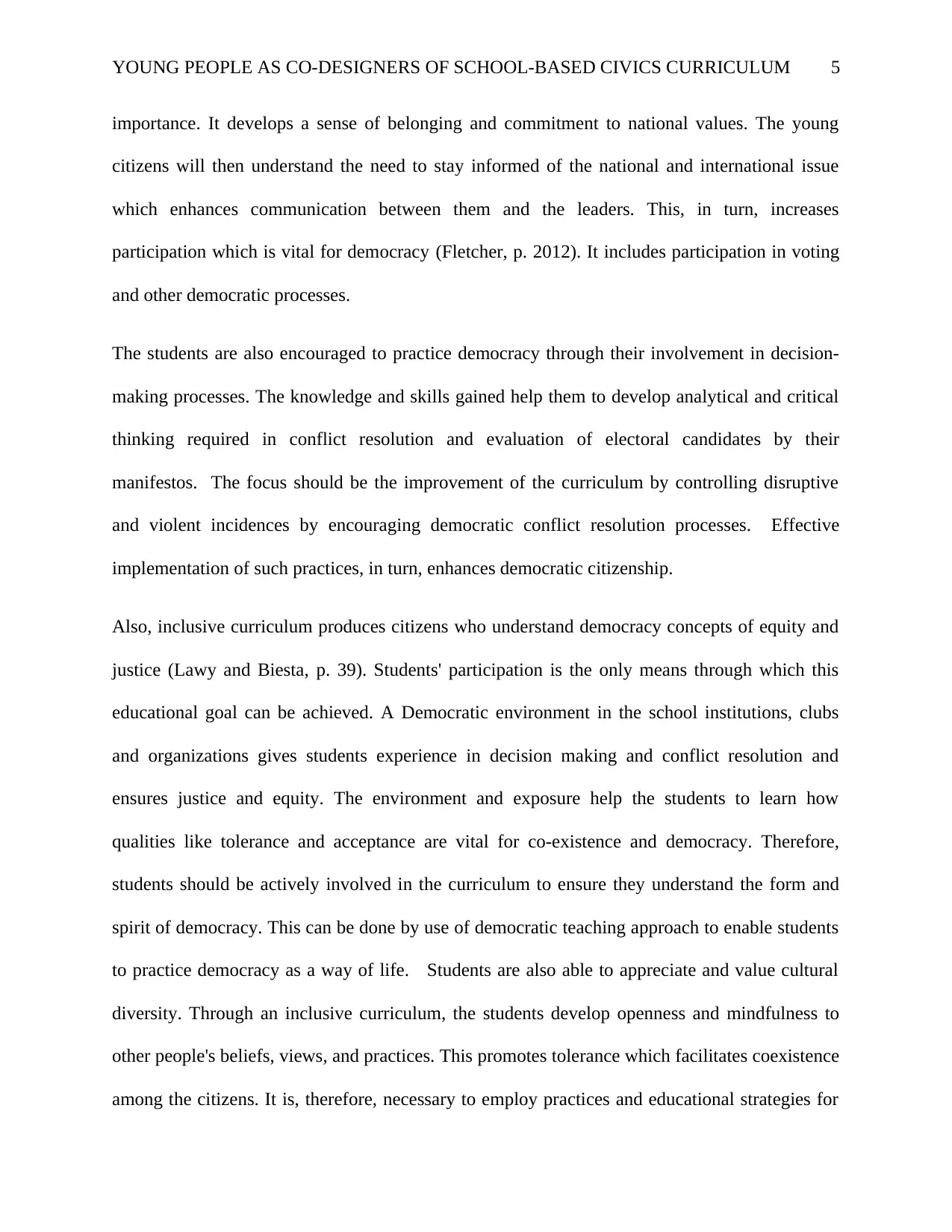
YOUNG PEOPLE AS CO-DESIGNERS OF SCHOOL-BASED CIVICS CURRICULUM 5
importance. It develops a sense of belonging and commitment to national values. The young
citizens will then understand the need to stay informed of the national and international issue
which enhances communication between them and the leaders. This, in turn, increases
participation which is vital for democracy (Fletcher, p. 2012). It includes participation in voting
and other democratic processes.
The students are also encouraged to practice democracy through their involvement in decision-
making processes. The knowledge and skills gained help them to develop analytical and critical
thinking required in conflict resolution and evaluation of electoral candidates by their
manifestos. The focus should be the improvement of the curriculum by controlling disruptive
and violent incidences by encouraging democratic conflict resolution processes. Effective
implementation of such practices, in turn, enhances democratic citizenship.
Also, inclusive curriculum produces citizens who understand democracy concepts of equity and
justice (Lawy and Biesta, p. 39). Students' participation is the only means through which this
educational goal can be achieved. A Democratic environment in the school institutions, clubs
and organizations gives students experience in decision making and conflict resolution and
ensures justice and equity. The environment and exposure help the students to learn how
qualities like tolerance and acceptance are vital for co-existence and democracy. Therefore,
students should be actively involved in the curriculum to ensure they understand the form and
spirit of democracy. This can be done by use of democratic teaching approach to enable students
to practice democracy as a way of life. Students are also able to appreciate and value cultural
diversity. Through an inclusive curriculum, the students develop openness and mindfulness to
other people's beliefs, views, and practices. This promotes tolerance which facilitates coexistence
among the citizens. It is, therefore, necessary to employ practices and educational strategies for
importance. It develops a sense of belonging and commitment to national values. The young
citizens will then understand the need to stay informed of the national and international issue
which enhances communication between them and the leaders. This, in turn, increases
participation which is vital for democracy (Fletcher, p. 2012). It includes participation in voting
and other democratic processes.
The students are also encouraged to practice democracy through their involvement in decision-
making processes. The knowledge and skills gained help them to develop analytical and critical
thinking required in conflict resolution and evaluation of electoral candidates by their
manifestos. The focus should be the improvement of the curriculum by controlling disruptive
and violent incidences by encouraging democratic conflict resolution processes. Effective
implementation of such practices, in turn, enhances democratic citizenship.
Also, inclusive curriculum produces citizens who understand democracy concepts of equity and
justice (Lawy and Biesta, p. 39). Students' participation is the only means through which this
educational goal can be achieved. A Democratic environment in the school institutions, clubs
and organizations gives students experience in decision making and conflict resolution and
ensures justice and equity. The environment and exposure help the students to learn how
qualities like tolerance and acceptance are vital for co-existence and democracy. Therefore,
students should be actively involved in the curriculum to ensure they understand the form and
spirit of democracy. This can be done by use of democratic teaching approach to enable students
to practice democracy as a way of life. Students are also able to appreciate and value cultural
diversity. Through an inclusive curriculum, the students develop openness and mindfulness to
other people's beliefs, views, and practices. This promotes tolerance which facilitates coexistence
among the citizens. It is, therefore, necessary to employ practices and educational strategies for
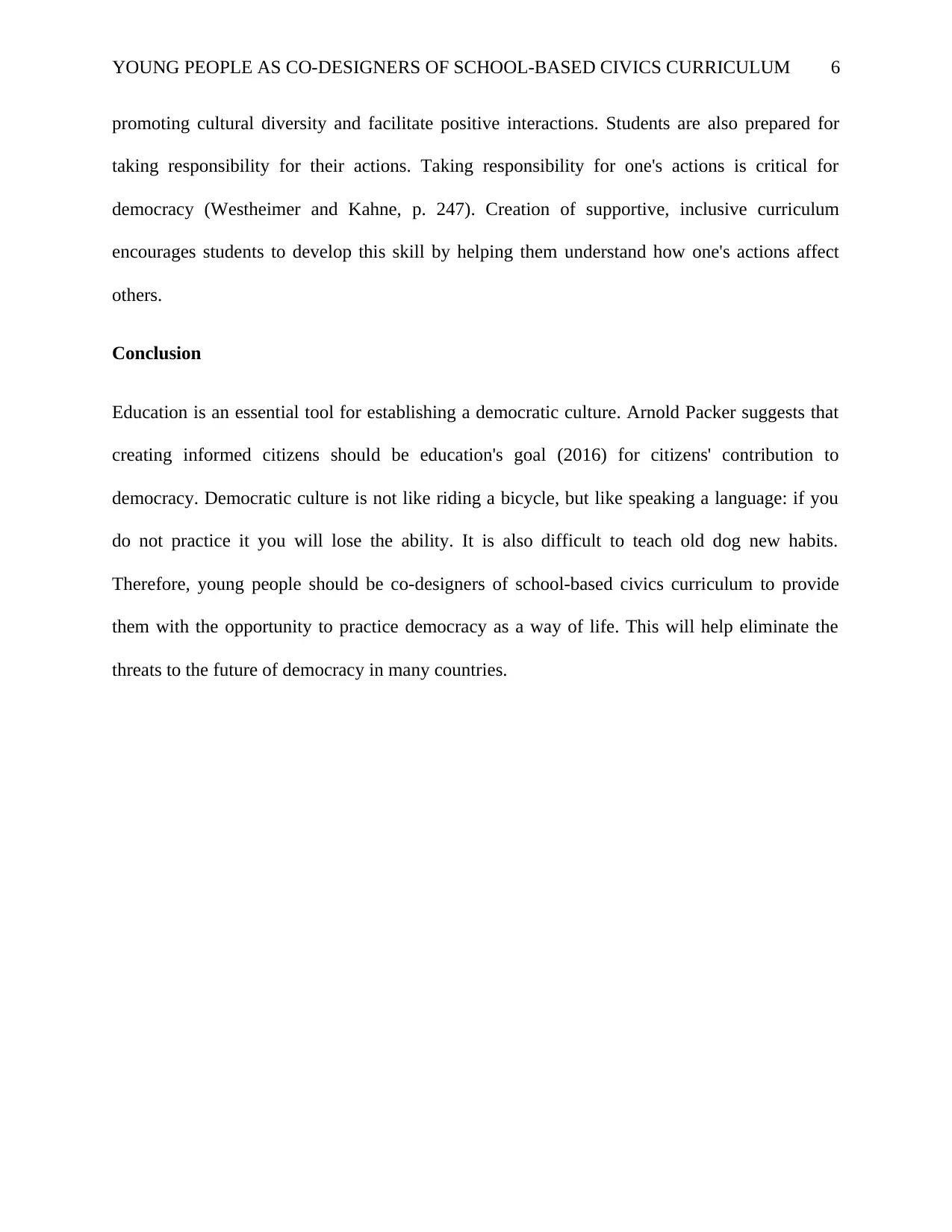
YOUNG PEOPLE AS CO-DESIGNERS OF SCHOOL-BASED CIVICS CURRICULUM 6
promoting cultural diversity and facilitate positive interactions. Students are also prepared for
taking responsibility for their actions. Taking responsibility for one's actions is critical for
democracy (Westheimer and Kahne, p. 247). Creation of supportive, inclusive curriculum
encourages students to develop this skill by helping them understand how one's actions affect
others.
Conclusion
Education is an essential tool for establishing a democratic culture. Arnold Packer suggests that
creating informed citizens should be education's goal (2016) for citizens' contribution to
democracy. Democratic culture is not like riding a bicycle, but like speaking a language: if you
do not practice it you will lose the ability. It is also difficult to teach old dog new habits.
Therefore, young people should be co-designers of school-based civics curriculum to provide
them with the opportunity to practice democracy as a way of life. This will help eliminate the
threats to the future of democracy in many countries.
promoting cultural diversity and facilitate positive interactions. Students are also prepared for
taking responsibility for their actions. Taking responsibility for one's actions is critical for
democracy (Westheimer and Kahne, p. 247). Creation of supportive, inclusive curriculum
encourages students to develop this skill by helping them understand how one's actions affect
others.
Conclusion
Education is an essential tool for establishing a democratic culture. Arnold Packer suggests that
creating informed citizens should be education's goal (2016) for citizens' contribution to
democracy. Democratic culture is not like riding a bicycle, but like speaking a language: if you
do not practice it you will lose the ability. It is also difficult to teach old dog new habits.
Therefore, young people should be co-designers of school-based civics curriculum to provide
them with the opportunity to practice democracy as a way of life. This will help eliminate the
threats to the future of democracy in many countries.
⊘ This is a preview!⊘
Do you want full access?
Subscribe today to unlock all pages.

Trusted by 1+ million students worldwide
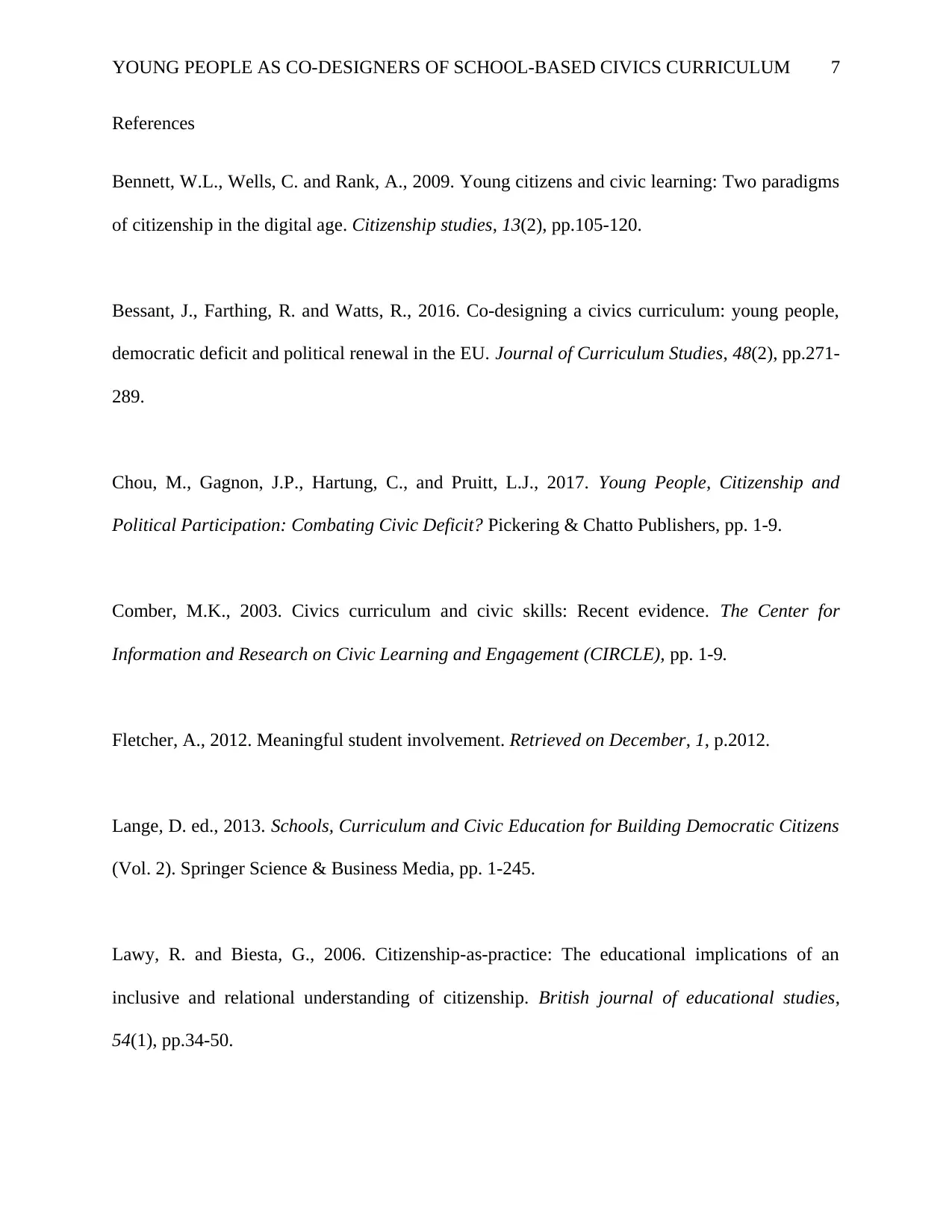
YOUNG PEOPLE AS CO-DESIGNERS OF SCHOOL-BASED CIVICS CURRICULUM 7
References
Bennett, W.L., Wells, C. and Rank, A., 2009. Young citizens and civic learning: Two paradigms
of citizenship in the digital age. Citizenship studies, 13(2), pp.105-120.
Bessant, J., Farthing, R. and Watts, R., 2016. Co-designing a civics curriculum: young people,
democratic deficit and political renewal in the EU. Journal of Curriculum Studies, 48(2), pp.271-
289.
Chou, M., Gagnon, J.P., Hartung, C., and Pruitt, L.J., 2017. Young People, Citizenship and
Political Participation: Combating Civic Deficit? Pickering & Chatto Publishers, pp. 1-9.
Comber, M.K., 2003. Civics curriculum and civic skills: Recent evidence. The Center for
Information and Research on Civic Learning and Engagement (CIRCLE), pp. 1-9.
Fletcher, A., 2012. Meaningful student involvement. Retrieved on December, 1, p.2012.
Lange, D. ed., 2013. Schools, Curriculum and Civic Education for Building Democratic Citizens
(Vol. 2). Springer Science & Business Media, pp. 1-245.
Lawy, R. and Biesta, G., 2006. Citizenship-as-practice: The educational implications of an
inclusive and relational understanding of citizenship. British journal of educational studies,
54(1), pp.34-50.
References
Bennett, W.L., Wells, C. and Rank, A., 2009. Young citizens and civic learning: Two paradigms
of citizenship in the digital age. Citizenship studies, 13(2), pp.105-120.
Bessant, J., Farthing, R. and Watts, R., 2016. Co-designing a civics curriculum: young people,
democratic deficit and political renewal in the EU. Journal of Curriculum Studies, 48(2), pp.271-
289.
Chou, M., Gagnon, J.P., Hartung, C., and Pruitt, L.J., 2017. Young People, Citizenship and
Political Participation: Combating Civic Deficit? Pickering & Chatto Publishers, pp. 1-9.
Comber, M.K., 2003. Civics curriculum and civic skills: Recent evidence. The Center for
Information and Research on Civic Learning and Engagement (CIRCLE), pp. 1-9.
Fletcher, A., 2012. Meaningful student involvement. Retrieved on December, 1, p.2012.
Lange, D. ed., 2013. Schools, Curriculum and Civic Education for Building Democratic Citizens
(Vol. 2). Springer Science & Business Media, pp. 1-245.
Lawy, R. and Biesta, G., 2006. Citizenship-as-practice: The educational implications of an
inclusive and relational understanding of citizenship. British journal of educational studies,
54(1), pp.34-50.
Paraphrase This Document
Need a fresh take? Get an instant paraphrase of this document with our AI Paraphraser
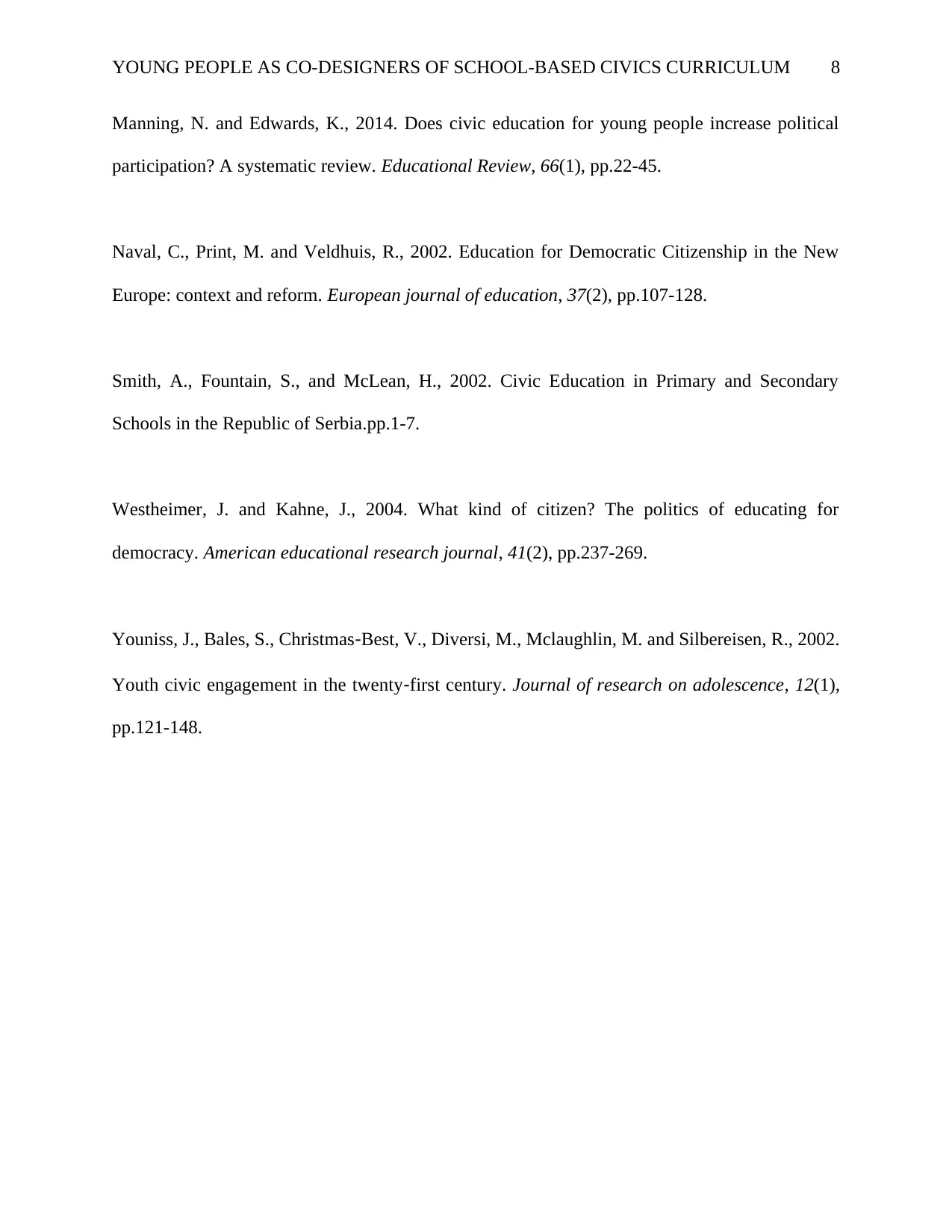
YOUNG PEOPLE AS CO-DESIGNERS OF SCHOOL-BASED CIVICS CURRICULUM 8
Manning, N. and Edwards, K., 2014. Does civic education for young people increase political
participation? A systematic review. Educational Review, 66(1), pp.22-45.
Naval, C., Print, M. and Veldhuis, R., 2002. Education for Democratic Citizenship in the New
Europe: context and reform. European journal of education, 37(2), pp.107-128.
Smith, A., Fountain, S., and McLean, H., 2002. Civic Education in Primary and Secondary
Schools in the Republic of Serbia.pp.1-7.
Westheimer, J. and Kahne, J., 2004. What kind of citizen? The politics of educating for
democracy. American educational research journal, 41(2), pp.237-269.
Youniss, J., Bales, S., Christmas‐Best, V., Diversi, M., Mclaughlin, M. and Silbereisen, R., 2002.
Youth civic engagement in the twenty‐first century. Journal of research on adolescence, 12(1),
pp.121-148.
Manning, N. and Edwards, K., 2014. Does civic education for young people increase political
participation? A systematic review. Educational Review, 66(1), pp.22-45.
Naval, C., Print, M. and Veldhuis, R., 2002. Education for Democratic Citizenship in the New
Europe: context and reform. European journal of education, 37(2), pp.107-128.
Smith, A., Fountain, S., and McLean, H., 2002. Civic Education in Primary and Secondary
Schools in the Republic of Serbia.pp.1-7.
Westheimer, J. and Kahne, J., 2004. What kind of citizen? The politics of educating for
democracy. American educational research journal, 41(2), pp.237-269.
Youniss, J., Bales, S., Christmas‐Best, V., Diversi, M., Mclaughlin, M. and Silbereisen, R., 2002.
Youth civic engagement in the twenty‐first century. Journal of research on adolescence, 12(1),
pp.121-148.
1 out of 8
Related Documents
Your All-in-One AI-Powered Toolkit for Academic Success.
+13062052269
info@desklib.com
Available 24*7 on WhatsApp / Email
![[object Object]](/_next/static/media/star-bottom.7253800d.svg)
Unlock your academic potential
Copyright © 2020–2026 A2Z Services. All Rights Reserved. Developed and managed by ZUCOL.





